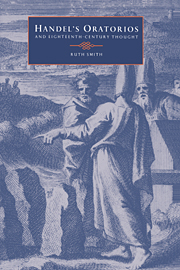Book contents
- Front Matter
- Contents
- Acknowledgements
- Abbreviations
- Introduction
- PART 1 ENGLISH ORIGINS OF ENGLISH ORATORIO
- PART II THE PATRIOT LIBRETTO FROM THE EXCISE BILL TO THE JEW BILL: ISRAELITE ORATORIOS AND ENGLISH POLITICS
- Chapter 8 Political events and political thought
- Chapter 9 Allegorical politics
- Chapter 10 Moral politics
- Chapter 11 ‘Esther’ to ‘Athalia’
- Chapter 12 In time of war
- Chapter 13 Images of government
- Chapter 14 The conflict of public and private interests
- Chapter 15 Coda: the end of Handel's Israelite oratorios
- Appendix I Libretto authors and sources
- Appendix 2 The oratorios and Methodism
- Notes
- Bibliography of sources cited
- Index
Chapter 10 - Moral politics
Published online by Cambridge University Press: 22 September 2009
- Front Matter
- Contents
- Acknowledgements
- Abbreviations
- Introduction
- PART 1 ENGLISH ORIGINS OF ENGLISH ORATORIO
- PART II THE PATRIOT LIBRETTO FROM THE EXCISE BILL TO THE JEW BILL: ISRAELITE ORATORIOS AND ENGLISH POLITICS
- Chapter 8 Political events and political thought
- Chapter 9 Allegorical politics
- Chapter 10 Moral politics
- Chapter 11 ‘Esther’ to ‘Athalia’
- Chapter 12 In time of war
- Chapter 13 Images of government
- Chapter 14 The conflict of public and private interests
- Chapter 15 Coda: the end of Handel's Israelite oratorios
- Appendix I Libretto authors and sources
- Appendix 2 The oratorios and Methodism
- Notes
- Bibliography of sources cited
- Index
Summary
To the modern audience of Handel's Israelite oratorios the narratives of the librettos and their common themes are unremarkable and usually unremarked. But if we look at their biblical sources, we notice that the librettists made choices – what to take, what to leave, what to emphasise – and used their minds more than they admitted in their genteel disclaimers of the value of their librettos. Compilers of anthem texts had established a precedent for bold selection, rearrangement and adaptation of holy writ for musical setting (see chapter 3), on which the librettists built. Some common elements, and some common emphases, in their manipulation of the Scriptures become apparent when we compare their texts with their sources. In general, we can say of the librettists that
they used the partisan focus on the Jewish people but not the division into factious tribes
they emphasised the conflict with other nations and greatly reduced the proportion of internecine strife
they used divinely aided Israelite victories but proportionately far fewer Israelite disasters
they used the priestly caste but not its dominance
they used the heroes' virtues but proportionately fewer of their human weaknesses
they used the concept of the Covenant and extended it (for example, there is no mention of God in the biblical Book of Esther)
Comparison of an individual libretto with its source fills out this picture.
- Type
- Chapter
- Information
- Handel's Oratorios and Eighteenth-Century Thought , pp. 233 - 275Publisher: Cambridge University PressPrint publication year: 1995



